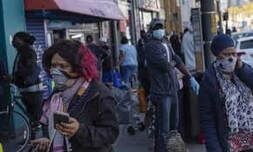Fighting Systemic Inequality: How Ethnic Minorities are disproportionately affected by Covid-191/27/2021
With the quick uprise of Covid-19, an airborne virus infecting more than 125 thousand people in Massachusetts, cities including Boston, Lynn, Everett, Revere, and Chelsea are the most at-risk and have the highest infection rates (3,4) . Similarly, these cities also have the highest population of black and Hispanic residents. While Hispanic and black people only account for 12% and 7% of the MA population, 30% and 14% of their respective populations have been infected. Why is this you may ask? Well, as epidemiologist Camara Phyllis Jones says, “People of color right now are more likely to be infected, and we’re more likely to die. What we’re seeing here is the direct result of racism”(5). This isn't just a current issue, this is systemic. The primary reason is because on average blacks and Hispanics have a lower income and lack the necessary resources to live in the suburbs, therefore attracting so many ethnic minorities to the inner city, where houses are cheaper, and labor is easier to find- often essential work where they are required to expose themselves and work during the pandemic. With such a dense population, cities, especially Boston, become a hotspot for pandemics and sickness, most recently, the Coronavirus.
Combating racial inequities will not be an easy battle that can be solved in an instant, but instead is a crucial action needed to be taken in order to assure that everyone is safe, and precautions are taken for future pandemics. Sources https://www.ncbi.nlm.nih.gov/books/NBK220347/ https://www.statista.com/statistics/200476/us-poverty-rate-by-ethnic-group/#:~:text=Poverty%20rate%20in%20the%20United%20States%20by%20ethnic%20group%202018&text=In%202018%2C%2020.8%20percent%20of,10.1%20percent%20of%20Asian%20people. https://www.masslive.com/news/2019/08/diversity-in-massachusetts-the-25-most-diverse-towns-and-cities-of-2019.html https://www.wcvb.com/article/new-covid-19-restrictions-take-effect-as-state-sees-spike-in-cases/33570681 https://www.statnews.com/2020/06/09/systemic-racism-black-health-disparities/ Comments are closed.
|
|

